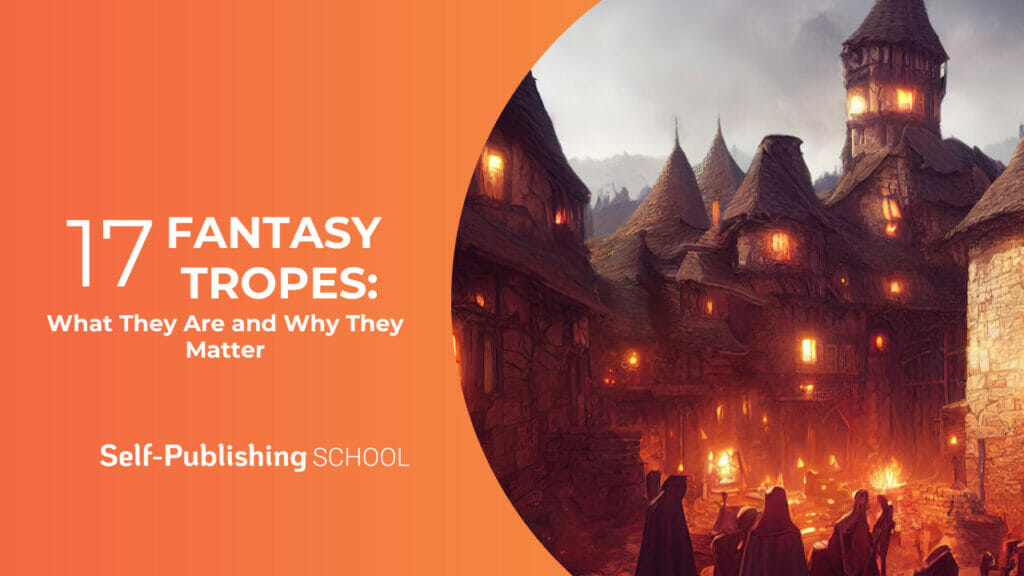
A trope is an element which is commonly found throughout a genre or type of media. It’s usually figurative—in other words, a character symbolizes a specific trope. The reader has seen this trope before, so they’re able to understand what’s going on on a figurative level.
Using tropes is like using shorthand. Because readers are familiar with them, they know what to expect, and you can use this in your writing to play along with or subvert expectations. Tropes are not the same as cliches, which are overused phrases that don’t really convey anything.
The fantasy genre in particular involves many easily identifiable tropes. Some new writers will take these tropes wholecloth without altering them or doing anything interesting, which is how a manuscript can become cookie-cutter or unoriginal. Being aware of which tropes you’re using will help you keep things fresh and interesting.
So, without further ado, here are some common fantasy tropes for you to use in your writing!
Common Fantasy Tropes
We’ll get into more specific subgenres of fantasy in a minute, but let’s start with fantasy on the whole. Here are some tropes you’ve almost definitely seen before:
The Chosen One
This character, generally the protagonist, learns one day that they’re the hero—something about them is different, and they’re destined to save the day. They might have some element of divinity or supernatural power to them, or they might be able to use magic in unique ways. Whatever the case may be, they’re the ones chosen by fate, prophecy, or extremely complicated supernatural circumstances to save the day.
The most obvious example of the Chosen One trope is Harry Potter. Because Voldemort chose him to be his last Horcrux, Harry is essential to defeating Voldemort. This unique tie to Voldemort gives Harry a special insight throughout the series.
The Mentor
The Mentor archetype is just what it sounds like. This character teaches our protagonist about themselves, their powers, and their destiny. They often have spiritual insight as well as practical knowledge, and they often help the hero along their inner journey as well as their quest. This character is usually an older man, but they absolutely don’t have to be.
Star Wars is full of mentor characters. Yoda and Obi-Wan Kenobi are the most obvious examples.
The Dark Lord
The Dark Lord is the evil bad guy who wants to destroy the world. They’re usually pretty plainly bad without a ton of nuance, and they usually represent capital-E Evil in the story’s world. They symbolize the gross underbelly of human behavior.
In The Lord of the Rings, Sauron is the Dark Lord. His motives and personality aren’t super important to the story because Sauron’s function in The Lord of the Rings isn’t really to be a character. He’s meant to represent evil, which our heroes must defeat to preserve the world.
Damsel in Distress
There’s a lady, she’s upset, and she needs to be rescued. The Damsel in Distress could be a princess, a queen, the hero’s love interest, a childhood best friend, a sister—all that really matters for this trope is that she’s a woman who needs saving.
This is a great example of why it’s important to be aware of tropes. The Damsel in Distress, when played straight, can be pretty sexist. Have you ever heard of the Sexy Lamp or Sack of Gold Test? If the woman could be replaced with a sexy lamp or a sack of gold without changing much, you haven’t written a character. You’ve written an object.
It’s not impossible to write about a woman who needs to be rescued in a way that honors her personhood. In Tangled, for example, Rapunzel is a girl locked in a tower who desperately wants out. How do the writers avoid turning her into a sack of gold? They give her agency. She gets herself out of the tower.
Antagonist-to-Hero
The antagonist-to-hero trope is a redemption arc where an antagonist becomes allied with the hero or becomes the hero of the story. This can be done in a ton of ways, but we are, of course, going to look to Zuko for inspiration.
Zuko isn’t the main antagonist of Avatar: the Last Airbender—his father, the Firelord, is. This means that when Zuko joins up with the Gaang, the conflict doesn’t go away. There’s still a bad guy to defeat. He also struggles over the course of almost the entire series with his family’s role in the destruction of the Four Nations, and watching him see and reckon with the effects of his father’s imperialism makes his turn to the good side compelling.
High Fantasy Tropes
Now, a few tropes specific to high fantasy:
The Wizard
Think Gandalf. The Wizard is usually older and usually male (again, super not necessary), and they often live in some kind of solitude. They have special knowledge and use of magic and they can offer special guidance, artifacts, magic, or insight to the hero. If this sounds like the Mentor, that’s because the Wizard often functions as a Mentor, although they don’t have to.
Magical artifacts
High fantasy often gets hung up on doohickeys—magic necklaces, enchanted wands, haunted heirlooms, you name it. In The Lord of the Rings, this is obviously the ring. Magical Artifacts often give their possessors some kind of power or magical ability, and they’re often necessary in the final fight against the bad guy.
It’s also pretty common for authors to combine the Magical Artifacts trope with the Chosen Ones trope by making the Chosen One the only person who can successfully wield the Magical Artifact.
Secret heirs
Our protagonist is trekking through the plot when suddenly, bam! They discover that they are, in fact, the heir to the throne, and they have been all along. How fortuitous!
The Secret Heir might realize they’re the secret heir at the beginning of the story, and this realization might kick the book into motion. It might also be a reveal towards the climax of the book, a final rung in their inner journey’s ladder.
Prophecies
Prophecies are predictions made by someone in the story, usually a divine or supernatural entity, which spell out the fate of our protagonist. In Rick Riordan’s Percy Jackson & The Olympians series, the oracle Delphi delivers prophecies to the campers, and these prophecies often determine who gets to go on quests and who has to stay home.
Sometimes, prophecies play out exactly as they’re told. Other times, the prophecy is subverted by some fine-line reading (think Macbeth being a C-section baby), or it might be disregarded altogether.
The Quest
In a high fantasy novel, it’s pretty regular for characters to go on some kind of journey to accomplish their goal. They’re on a trip to get something, save someone, return something to somewhere—whatever it might be, it’s a Quest, and it’s often the framework for the plot.
In the TV adaptation of Game of Thrones, Brienne embarks on a quest to return Jamie to King’s Landing in exchange for Arya and Sansa Stark. Later, she quests to find Sansa, then to deliver Arya to her family. Brienne does a ton of questing in Game of Thrones, it turns out.
Urban Fantasy Tropes
Now that we’ve got high fantasy covered, what about urban fantasy?
Secret hidden worlds
The story starts with a regular person in their regular, real-world life, and then we’re taken to the secret magical world. This is a world that exists alongside our world, but which doesn’t interact with our world (or at least isn’t supposed to).
Twilight is a great example of a secret hidden world. Bella moves to Forks, Washington, and it’s pretty much a regular small town until she finds out about the whole vampires-and-werewolves thing. Not only are there vampires and werewolves, but they have a long, complicated lore, and they live mostly in secret from the ‘real’ world. Much of Bella’s conflict in the Twilight saga comes from being caught between these two worlds.
Novice to expert
This isn’t exclusive to urban fantasy—there are examples in high fantasy and sci-fi, too—but I personally have seen the novice-to-expert trope most often in urban fantasy books. This is when a character, generally the protagonist, who just found out about magic yesterday, becomes the best magician in the whole world overnight.
This can be done successfully, but it often feels cheap and unearned. Authors use it because it’s easy, and it catches our protagonist up to speed with the magical world without needing to take the time to develop their skills. However, it often makes the reader feel like the magic isn’t very difficult to wield, or that the protagonist isn’t particularly skilled—if some regular guy could become a master in a week, it can’t be that cool, right?
Not to say that it can’t be done! Just make sure you’re keeping your readers invested.
All the fairy tales are true
This is similar to the Secret Hidden World, but it’s a little more grounded, and it involves less separation between the ‘real’ and ‘magical’ world. This trope introduces a specific piece of folklore or mythology (sometimes a real piece of folklore, sometimes made up just for the story) and asks outright: what if this fairy tale were true?
I, personally, would count National Treasure as urban fantasy because of this trope.
Super cool hero school
Your protagonist has just discovered that they’re secretly a part of the magical world somehow, and now they have to go to magical-world school to learn the ropes. This is often a setting where the author gets to explain the magical world to the audience, show the protagonist struggling to fit in with other magical people, and serves as a sort of launching-off point for the main conflict.
Again, Percy Jackson & the Olympians is a great example. Camp Half-Blood is where Percy learns the ins and outs of what it means to be a demigod, and it’s where he gets his first quest.
Science Fiction Tropes
Last but not least, let’s take a look at some tropes commonly found in sci-fi.
Time travel
Time travel is sci-fi’s version of a secret hidden world. Characters are thrust into a different time period, and this functions as a different world—different points in history had different customs, attitudes, and expectations, all of which usually conflict with our modern-day characters.
Super-tech
In science fiction, it’s not as common to see magic. More often, you’ll see super advanced technology. If you look a little closer, though, you’ll see that in general, this functions almost exactly like magic. It’s a special ability with internal rules which is designed to do things which are impossible for us to replicate in our homes.
Cloning
Jurassic Park is the textbook example of this trope, and it’s just what you’d think: someone has figured out how to clone, and they’re not being cool about it.
Clones might be created accidentally or intentionally to serve as the book’s main antagonistic force, or the story might grapple with a sympathetic clone and talk about the ethics around cloning. What does it mean to be a clone? Are clones human? Double Identity by Margaret Peterson Haddix is a wonderful example.
See any tropes on this list that you love? Any that you hate? Any we didn’t cover? Let us know in the comments!
What’s next?
Try our writing prompt generator and start creating your next masterpiece.


Book Outline Generator
Choose your Fiction or Nonfiction book type below to get your free chapter by chapter outline!
Book Outline Generator
Enter your details below and get your pre-formatted outline in your inbox and start writing today!
CONGRATULATIONS
Thanks for submitting! Check your email for your book outline template.
In the meantime, check out our Book Outline Challenge.
